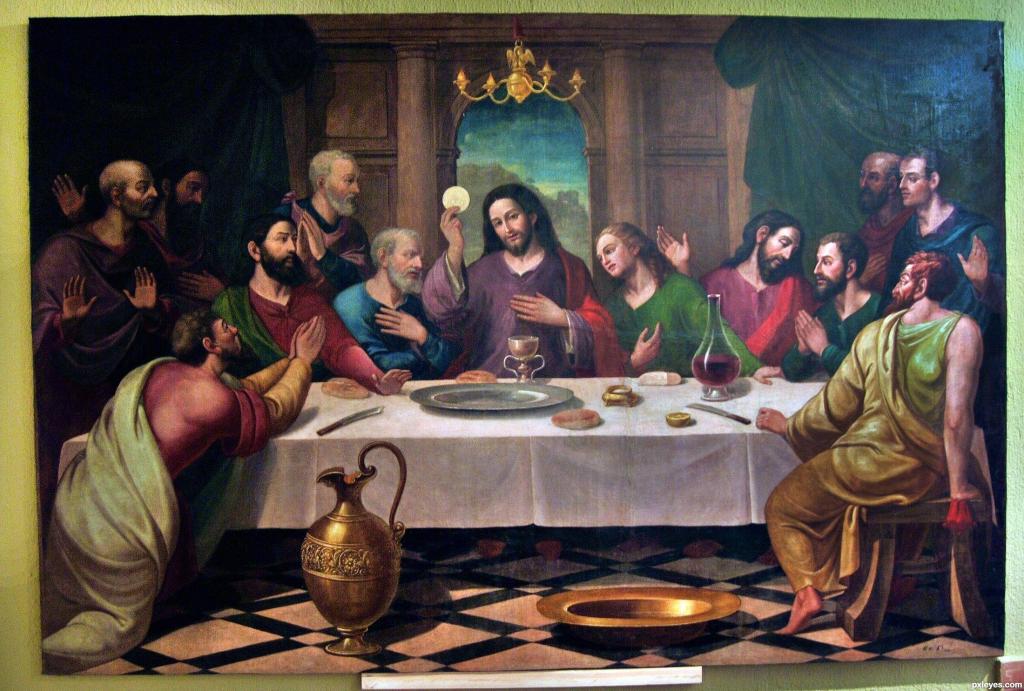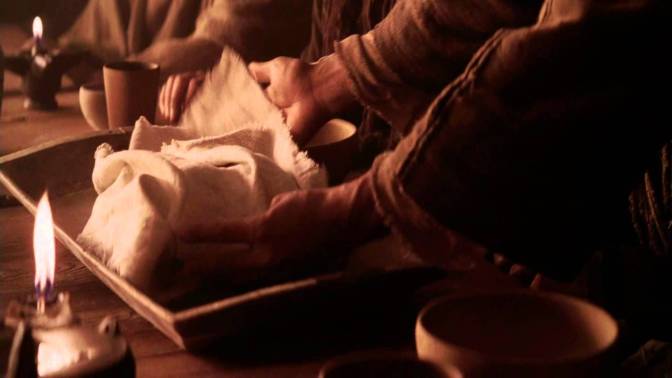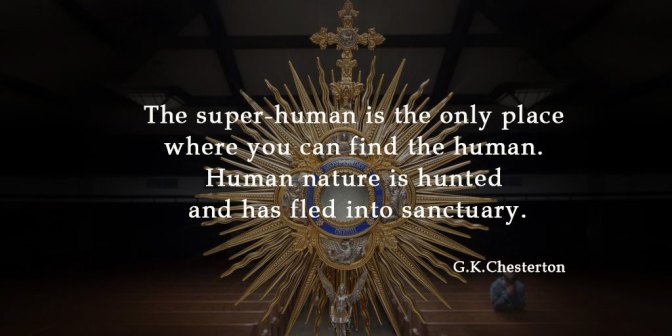The Body, Blood, Soul, and divinity of Christ

Holy Thursday
Now as they were eating, Jesus took bread, and after blessing it broke it and gave it to the disciples, and said, “Take, eat; this is my body.” And he took a cup, and when he had given thanks he gave it to them, saying, “Drink of it, all of you, for this is my blood of the covenant, which is poured out for many for the forgiveness of sins. I tell you I will not drink again of this fruit of the vine until that day when I drink it new with you in my Father’s kingdom.”
A new commandment I give to you, that you love one another, even as I have loved you, that you also love one another.
Even so faith, if it has no works, is dead, being by itself.But someone may well say, “You have faith and I have works; show me your faith without the works, and I will show you my faith by my works.” You believe that God is one. You do well; the demons also believe, and shudder. But are you willing to recognize, you foolish fellow, that faith without works is useless? Was not Abraham our father justified by works when he offered up Isaac his son on the altar? You see that faith was working with his works, and as a result of the works, faith was perfected; and the Scripture was fulfilled which says, “AND ABRAHAM BELIEVED GOD, AND IT WAS RECKONED TO HIM AS RIGHTEOUSNESS,” and he was called the friend of God. You see that a man is justified by works and not by faith alone. In the same way, was not Rahab the harlot also justified by works when she received the messengers and sent them out by another way? For just as the body without the spirit is dead, so also faith without works is dead.
Matthew 26:26-29; John 13:34; James 2:17-26
Holy Week Prayer: My Jesus, I believe that You are present in the Most Holy Sacrament. I love You above all things, and I desire to receive You into my soul. Since I cannot at this moment receive You sacramentally, come at least spiritually into my heart. I embrace You as if You were already there and unite myself wholly to You. Never permit me to be separated from You. Amen. Ora Pro Nobis *
This day is also known as Maundy Thursday. “Maundy” comes from the Latin word ‘mandatum‘, or commandment, reflecting Jesus’ words “I give you a new commandment.” Now this is a very important distinction to make note of between being asked to “Do this in remembrance of me” and being commanded “that you love one another even as I have loved you”. One is a request and the other a commandment. Which is Jesus giving more weight? Adoration? Or learning to die to self and give of ourselves, yes, even our lives for others? Or is He, as with most of the paradoxes in Holy Scripture, telling us that the one renders us capable of doing the other, that they are joined somehow in the same purpose?

Has our Christian fellowship been practicing such daily with others? We live not yet in an area and time where God has asked martyrdom of us. But every Christian is asked, in marriage and in daily life in the service of God toward our brothers and our fellow man, to die to self. But have we been doing that? Or are we more focused on our rights? On this Holy Thursday, this Maundy Thursday, we remember two things: One, as Chesterton’s quote below tells us, is an object of faith that we agree to believe in – the Body, Blood, Soul and Divinity of Christ and the other is a commandment demonstrating a work of faith.
This is the difference between the Protestant and the Catholic. To the Protestant, Maundy Thursday has come to mean the washing of the feet of the Apostles. But to the Catholic, it is the aim of that washing – what takes place at the Last Supper itself: The institution of the First Eucharist: the Body, Blood, Soul, and Divinity of Christ Himself, now given to us in the taking of the Eucharist into our bodies that we might have His life in us.

Both an object and a work of faith
“I shall say very little about the greatest of all, because it is admittedly a mystery and an object of faith**. Catholics believe that in the Blessed Sacrament Christ is present, not merely as a thought is present in a mind, but as a person is present in a room, veiled only from the actual senses by the appearances of bread and wine. Of its historical aspect it will be enough to say that Roman Catholics are convinced that it is spoken of in this spirit at least as early as St. Ignatius, who was roughly of the next generation to that of the Gospel. The common sense of it, it seems to me, would be to say that if the words of Christ at the Last Supper were misunderstood, they were misunderstood by the twelve Apostles.”
-G. K. Chesterton, Upon This Rock, An Outline of Christianity, 1926
*NOTE: St. Thomas Aquinas defined Spiritual Communion as “an ardent desire to receive Jesus in the Holy Sacrament and a loving embrace as though we had already received Him.”[4]
The basis of this practice was explained by Pope John Paul II in his encyclical, Ecclesia de Eucharistia:
“In the Eucharist, “unlike any other sacrament, the mystery [of communion] is so perfect that it brings us to the heights of every good thing: Here is the ultimate goal of every human desire, because here we attain God and God joins himself to us in the most perfect union.” Precisely for this reason it is good to cultivate in our hearts a constant desire for the sacrament of the Eucharist. This was the origin of the practice of “spiritual communion,” which has happily been established in the Church for centuries and recommended by saints who were masters of the spiritual life. St. Teresa of Jesus wrote: “When you do not receive communion and you do not attend Mass, you can make a spiritual communion, which is a most beneficial practice; by it the love of God will be greatly impressed on you” [The Way of Perfection, Ch. 35.].1 .
**Chesterton spoke about the “object of faith” in another instance of his writings : “[…] the word Eucharist is but a verbal symbol, we might say a vague verbal mask, for something so tremendous that the assertion and the denial of it have alike seemed a blasphemy: a blasphemy that has shaken the world with the earthquake of two thousand years.” -GKC, “Christendom in Dublin” (1932)

